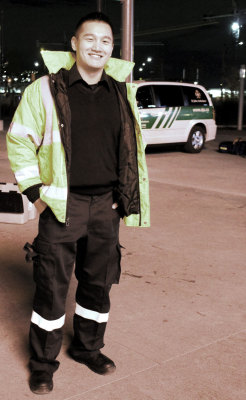
STORY BY MEHREEN SHAHID
When he signed up for a career in paramedic services, saving lives was all that was on Nathan Lam’s mind. His first call to perform cardiopulmonary resuscitation, however, turned out to be just the opposite.
When the patient didn’t survive, Lam, a second-year paramedic diploma student at Humber College, wanted to tell the family that they were not alone in what they felt at their loss.
“I think everyone is just looking for someone to reaffirm they’re not alone,” said Lam, who lost his mother to ALS two months before the call.
Lam remembers the night of his first CPR call clearly and talking about it even six months later makes him jittery.
The day started out with routine calls for minor problems. Later, when he was sitting in the Peel Region ambulance station, raring to go on his next call, he didn’t have to wait too long. It was a heart attack and the patient had no vital signs.
When they arrived at the address, his supervisor asked him if he was ready to do CPR. Lam, the ever-eager student, immediately jumped out of the ambulance and went into the house.
Other EMS units, fire trucks and police cars were already parked outside, flooding the house and its neighbours in brilliant lights.
“We went upstairs,” said Lam. “I stepped forward and identified myself as a paramedic student and waited for instructions, ready to go.” When the other EMS and firefighters stepped aside, he was told to perform CPR on the patient.
MORE RELATED TO THIS STORY:
“And I remember, the simplest maneuver we’d learned on mannequins, my hands were shaking now doing them.”
Skills he had excelled at performing in class snapped into action, but trying to apply theory for the first time was intense. He looked up and saw everyone around him working as a unit doing what they had to do.
“I eventually moved on to compressions,” said the 25-year-old. “That’s when I really zoned into what I had learned.”
While performing compressions, emergency responders are required to switch places every two minutes to prevent exhaustion and ensure quality care to the patient.
“But it’s tiring, very tiring.”
At one point, his team looked at him and said, “Yeah, you look tired now. Switch with one of the firemen to do the compressions.”
He looked down at the patient, who reminded Lam of a friend’s parent, and it got to him for a second.
Eventually, when the EMS had gone through everything they could do for the patient, they had to let go. “I watched as one of my field-training officers delivered the death notice.”
He looked at the patient’s family standing there, and he immediately identified with them. Lam lost his mother in February this year. Seeing the patient’s family’s despair and grief took him back to the last days spent in the hospital with his mother, who had ALS for four years.
“As I saw their reaction, it brought me right back to the hospital bedside. And that’s all that played back in my head for I don’t know how long.”
Lam thinks his mother’s death was a silver lining after watching her deteriorate for so long. The feeling she was trapped in her own body frightened him. He was terrified to think that maybe one day she would be reduced to communicating with her family with blinks only.
Walking out of the CPR patient’s house, Lam made his way to the back of an ambulance and sat down.
“I broke down in the back of the truck and bawled all the way back to the station.”
He spoke to his supervisors, who took him aside and reassured him that his experience had indeed been intense. Given his mother’s death a few months prior, his reaction was understandable. They told him to take a couple of days off. He was back on duty two days later.
“It’s cathartic to talk about this, as much as I’ve told this story to my peers,” Lam said of his first CPR call.
“It’s an outlet to explaining it to people who haven’t had the same experience. It’s something I’m dealing with day-to-day, and it’s helped me process what I’ve gone through.”
Lam said he is aware that he has to put aside memories of his first CPR experience and focus on the patients. He finds that his undergrad in psychology from York University paired with counselling sessions helps him deal with his emotions.
He feels people are sometimes scared of the health-care system.
“Having that openness and showing people that we understand what you’re going through and letting them know they’re not alone makes all the difference.”
